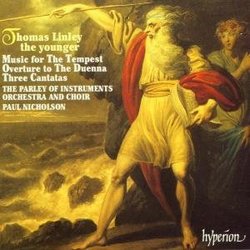| All Artists: Linley, Gooding, Nicholson, Parley of Instr Title: Linley: Cantatas and Theatre Music (English Orpheus, Vol 30) /Gooding * Goodwin * Parley of Instruments * Nicholson Members Wishing: 1 Total Copies: 0 Label: Hyperion UK Release Date: 6/6/1995 Album Type: Import Genres: Special Interest, Classical Styles: Opera & Classical Vocal, Chamber Music, Historical Periods, Classical (c.1770-1830) Number of Discs: 1 SwapaCD Credits: 1 UPC: 034571167671 |
Search - Linley, Gooding, Nicholson :: Linley: Cantatas and Theatre Music (English Orpheus, Vol 30) /Gooding * Goodwin * Parley of Instruments * Nicholson
 | Linley, Gooding, Nicholson Linley: Cantatas and Theatre Music (English Orpheus, Vol 30) /Gooding * Goodwin * Parley of Instruments * Nicholson Genres: Special Interest, Classical |
Larger Image |
CD Details |
CD ReviewsThe storm chorus will blow you away! Dalua | the UK | 08/03/2003 (5 out of 5 stars) "Thomas Linley the younger died in a boating accident at the age of twenty-two. If comparisons to Mozart (his friend and contemporary) are to be believed, the loss to English music was considerable. Mozart himself is said to have remarked that "Linley was a true genius" whom, "had he lived, would have been one of the greatest ornaments of the musical world."The most striking piece of music in this collection is the magnificent storm chorus, "Arise! ye spirits of the storm". With words by Richard Brinsley Sheridan, it forms the opening scene of a revival and adaptation at Drury Lane of Shakespeare's play "The Tempest". It is a fully convincing and imaginative conjuration of 'mighty winds' tearing at 'wild waves', of lightning strikes, and of the amazement with which the storm is beheld.The storm chorus is followed by the brilliant air "O bid your faithful Ariel fly", also penned by Sheridan. Linley sets some of Shakespeare's text (e.g. "Come unto these yellow sands") himself but borrows Thomas Arne's charming setting of "Where the bee sucks", adding a chorus.Next on this recording comes the Overture to the Duenna, in three movements - of which the Adagio and especially the Rondeau are the most pleasing. In his notes, Peter Holman refers to The Duenna as "one of the most successful English operas; it held the stage all over Britain until the 1840s." That being so, it seems a shame that it should be represented here solely by the overture - but perhaps Hyperion will one day ask a company such as Opera Restor'd to record more of it.Of the three cantatas that follow, "In yonder grove", is my least favourite, partially because of the rather poor text. Its author, Elizabeth Linley, Thomas's elder sister, does a better job of "Ye nymphs of Albion's beauty-blooming isle" - and Thomas Linley's setting is more mature and more inspired, the air "Wrapt close from harm" being particularly stirring. The final cantata, set in early mediaeval Scotland, by James MacPherson (Ossian), tells of the suicide of Darthula, lover of Nathos, son of Usnoth, Lord of Etha (in modern Argyll).Not surprisingly it is the storm chorus that stands out in this collection, along with "O bid your faithful Ariel fly" and Arne's "Where the bee sucks". However, the cantata "Ye nymphs of Albion's beauty-blooming isle" also effectively displays the composer's melodic genius. I do wonder whether had the sweet-voiced Julia Gooding - who delivers marvellously Ariel's first air and the aforementioned cantata - been replaced in some parts of the disc with a more vigorous, more confident voice (or had Gooding attained the broadness of sound she does in parts of recitatives in Darthula, for example, in her arias) - this disc would not sell Linley's accomplishments more solidly. But before ending this review, I must remind readers to listen to the sound sample from "Arise! ye spirits of the storm" and see if that is not solid accomplishment enough to sell this CD."
|
